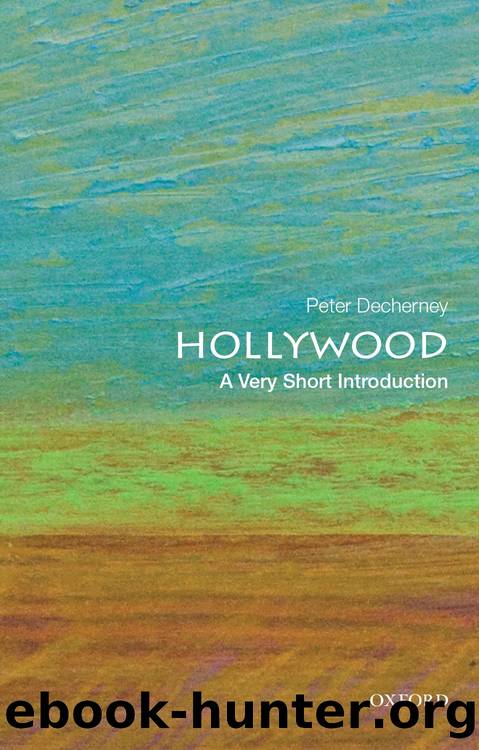Hollywood by Peter Decherney

Author:Peter Decherney [Decherney, Peter]
Language: eng
Format: epub
ISBN: 9780199943548
Publisher: Oxford University Press
Published: 2015-10-27T00:00:00+00:00
Chapter 5
The blacklist and the Cold War
Hollywoodâs foray into politics during World War II had major repercussions in the postwar period. It led to standoffs with conservative factions in Congress, fractured the Hollywood community, and prompted the studios to take extreme actions to win back American moviegoers.
HUAC in Hollywood
Even before the United States entered the war, antiâNew Deal Republicans in Congress attacked the film studiosâsingling out Warner Bros.âfor pushing the country toward military intervention. After the war, the House Committee on Un-American Activities, or HUAC, became a standing Congressional committee. Opportunistic members of Congress rode a wave of anticommunism and renewed the offensive against Hollywood. The committee hearings were media spectacles, creating front-page headlines and, in the 1950s, a television media circus as well.
Outspoken anticommunist Senator Joseph McCarthy is often mistakenly thought to have been a member of HUAC, but he had his own Senate committee that investigated alleged communist infiltration of the government. Although McCarthy did not participate in the Hollywood hearings, the vicious personal attacks for political gain that came to be called McCarthyism destroyed many promising Hollywood careers, and it boosted the careers of politicians, including future presidents Richard Nixon and Ronald Reagan.
At first, HUAC went after the activities of the Anti-Nazi League and looked for communist messages in Mission to Moscow and other films from the Soviet cycle. But the committee members soon learned that taking on major party donors like the Hollywood moguls was politically messy, and locating hidden communist messages in films was not a clear-cut task.
The committee quickly turned to questioning well-known actors and directors, whose celebrity attracted public interest to their cause. During the hearings, writers, directors, actors, and producers took the stand, forever changing their personal and professional lives. It was a period of soul searching, strained friendships, and often dire circumstances. More than a half century later, HUAC testimony continues to reverberate in the film industry and beyond.
One of the first Hollywood representatives to talk to HUAC was Eric Johnston. Johnston assumed the leadership of the MPPDAâby then renamed the Motion Picture Association of Americaâfrom Will Hays. Testifying before HUAC, Johnston read a reasonable statement, claiming that there were in fact some communists in Hollywood and that it was their right to hold radical political views as long as they did not advocate the overthrow of the US government. Johnston may have been both technically and morally right. There were communists in Hollywood (three hundred by one count), and the First Amendment gave them the right to voice politically unpopular views. But as Johnston would later learn, these were extreme times, and even basic constitutional rights were in limbo.
HUAC continued to call witnesses from all sides of the issue. On the governmentâs side were âfriendlyâ witnesses, who corroborated HUACâs assertions that communists lurked in the movie industry. Friendly witnesses were largely drawn from the ranks of a Hollywood group called the Motion Picture Alliance for the Preservation of American Ideals. The organization included conservative anticommunist actors and directors Gary Cooper, Cecil B.
Download
This site does not store any files on its server. We only index and link to content provided by other sites. Please contact the content providers to delete copyright contents if any and email us, we'll remove relevant links or contents immediately.
Whiskies Galore by Ian Buxton(41993)
Introduction to Aircraft Design (Cambridge Aerospace Series) by John P. Fielding(33116)
Small Unmanned Fixed-wing Aircraft Design by Andrew J. Keane Andras Sobester James P. Scanlan & András Sóbester & James P. Scanlan(32789)
Craft Beer for the Homebrewer by Michael Agnew(18235)
Turbulence by E. J. Noyes(8040)
The Complete Stick Figure Physics Tutorials by Allen Sarah(7362)
The Thirst by Nesbo Jo(6932)
Kaplan MCAT General Chemistry Review by Kaplan(6926)
Bad Blood by John Carreyrou(6611)
Modelling of Convective Heat and Mass Transfer in Rotating Flows by Igor V. Shevchuk(6432)
Learning SQL by Alan Beaulieu(6280)
Weapons of Math Destruction by Cathy O'Neil(6264)
Man-made Catastrophes and Risk Information Concealment by Dmitry Chernov & Didier Sornette(6004)
Digital Minimalism by Cal Newport;(5749)
Life 3.0: Being Human in the Age of Artificial Intelligence by Tegmark Max(5546)
iGen by Jean M. Twenge(5408)
Secrets of Antigravity Propulsion: Tesla, UFOs, and Classified Aerospace Technology by Ph.D. Paul A. Laviolette(5364)
Design of Trajectory Optimization Approach for Space Maneuver Vehicle Skip Entry Problems by Runqi Chai & Al Savvaris & Antonios Tsourdos & Senchun Chai(5063)
Pale Blue Dot by Carl Sagan(4996)
